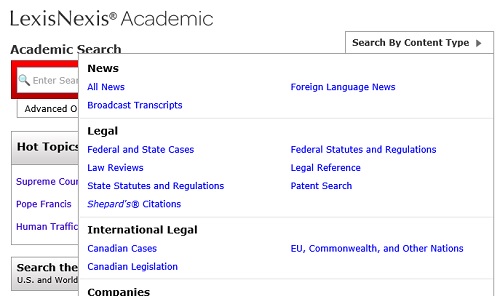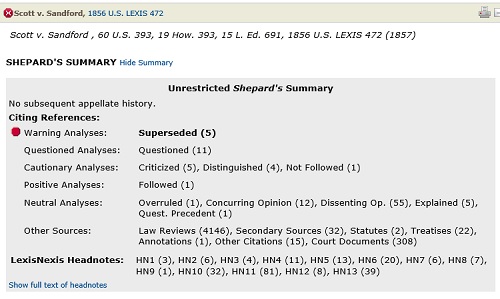For the last few weeks, we’ve been looking at how to get the most out of scholarly resources for each discipline taught at IU East, and this week we’ll look at criminal justice. Many of these methods will build off of the general techniques we explored earlier, but some are unique to this field.
Like medicine, law is another type of information that you don’t want to leave to the free web. There’s a lot of misinformation and commercial material out there, and it can be hard to determine fact from advocacy. Fortunately, there are plenty of good, reliable tools – and all of our criminal justice-related sources can be found here. Databases like SocIndex or ProQuest Criminal Justice are perfect for high-quality articles and research on legal and criminal justice topics like law enforcement, corrections, rehabilitation, family law, or drug enforcement.
So, if we had a topic like “What are the prevalence or types of police misconduct, not counting extreme things like tampering with evidence or framing a defendant?” Using our basic techniques, we might construct a search like this:
You can see that we’re looking for two distinct concepts with this search (the words grouped in parentheses) and excluding a third concept (the types of misconduct we’re not interested in). A search like this will give us more of what we want, and less that we don’t. If we’d just typed ‘police misconduct’ and hit the search button, we would miss a lot of articles relevant to us and get back others that focused on the wrong things. Although it can seem time-consuming, setting up a good search always improves the speed and accuracy of research.
But while these databases are great, the most comprehensive legal source is Lexis Nexis. Lexis Nexis also includes news and business information, but the true strength of the database is in the depth and connectedness of its legal information. And it is indeed powerful – you can look up any federal or state legal case. You can look at the United States or any individual state’s constitution, legal code, statutes, administrative regulations, or court rules. You can browse law review journals. You can even look up patents. Some legislation and case law from Canada and the European Union are also included.
Some of this material is in the public domain – Indiana case law, for example, can be found on the state’s website. But Lexis-Nexis is organized and interconnected in a way that makes it by far your best choice for legal research. And it is well-suited for many of the specific needs of legal researchers.
CODE LAW VS. CASE LAW
‘Code’ or ‘Statutory’ law is law created by legislators, like Congress. They write and pass laws, which courts then interpret and enforce. Often codes are quite lengthy and specific, covering many tens of thousands of pages, and in a country like the United States, there is a delicate interplay between what is covered by Federal laws (laws affecting the whole country) and State laws (which can differ greatly in defining crimes and their punishments).
However, legislators can never predict every eventuality, so frequently courts will have to interpret the law’s intent in a new situation. Case law, or Precedent, is the practice of courts to respect previous court decisions in ruling on their cases, so as to make legal decisions more predictable and fair. Precedent can be used directly, or to inform a similar, but not quite the same, situation.
In Lexis Nexis, under ‘search by content type’, choose the type of law that you want. So for statutory law, you may want something like Burns Indiana Code § 35-42-1-1, the statute which describes homicide. Or, if you’re interested in a specific case, you may look for a federal decision like Roe v. Wade , 410 U.S. 113 or an Indiana decision like Castor v. State, 587 N.E.2d 1281. Regardless, you have a lot of options – you can search by keyword, citation, or the names of the parties.
‘SHEPARDIZE’ A CASE
Almost always, you need to know how a point of law has been used in later cases. For decades, a product that did this was Shepard’s Citations, a company that indexed cases by whenever they were mentioned in later rulings or decisions – so lawyers came to refer to doing this type of research as ‘Shepardizing’ a case. That company was purchased by Lexis Nexis, and is now an integral part of the database. The online version is easier to use than the old book format – start by simply pull up a case, such as Scott v. Sandford , 60 U.S. 393.
The red stop sign on the left side of the screen is a warning that a major point of law used in this case has been subsequently overridden. A yellow warning sign indicates that there may be some change, and a green symbol means the case or point of law is still valid. To find out, on the right side of the screen, under ‘next steps’, choose ‘Shepardize this’. In this example, we can see that the decision has been ‘superseded’ by subsequent decisions and laws – that is, it is no longer valid. If the case was ‘followed by’ others, it would still be valid. The whole legislative history is listed below (the Dredd Scott case is a fairly extreme example, and the legislative history for this one is very lengthy).
LEGAL STATISTICS
The best source for reliable statistical information is the United States government. Several publications cover different aspects of legal, crime, and law enforcement statistics. The most comprehensive of these is the Statistical Abstract of the United States (section 5 deals with criminal justice topics), although it ceased publication in 2012 due to budget cuts. Fortunately, the Bureau of Justice Statistics and the FBI Uniform Crime Reports offer in-depth information on a variety of topics, including data on both victims and offenders. Individual states also produce crime statistics, but with less consistency than the federal government.
With these tools, starting research on a criminal justice topic will be much easier. But if you have any questions, please contact us at iueref@iue.edu!



